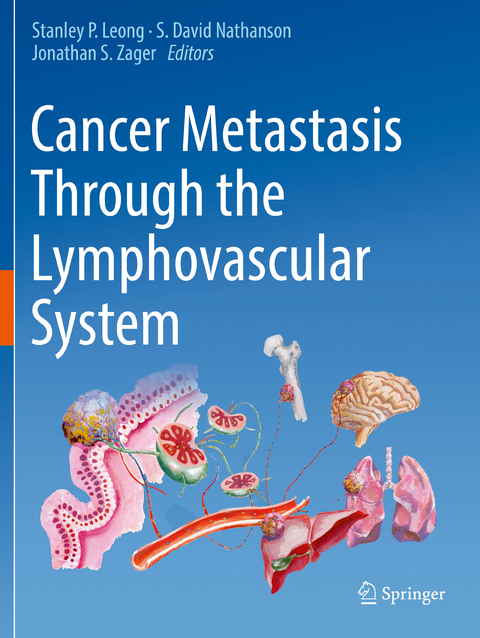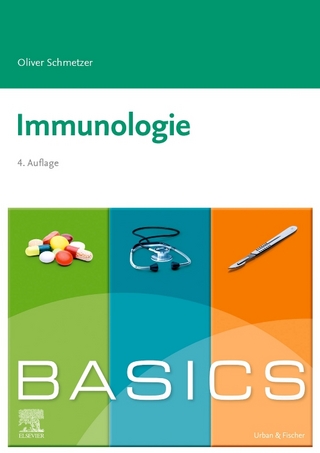
Cancer Metastasis Through the Lymphovascular System
Springer International Publishing (Verlag)
978-3-030-93086-8 (ISBN)
This textbook describes in detail the process of cancer metastasis from a single cell in the primary site through its arduous journey to the sentinel lymph node as the main gateway and beyond to distant sites. The most up-to-date knowledge on key topics in the molecular biology, diagnosis, and treatment of metastatic cancer is highlighted by a large panel of experts.
The book begins with a comprehensive overview of the genetic and molecular mechanisms that promote or inhibit cancer metastasis through lymphatic pathways to lymph nodes or through vascular pathways to distant sites, providing the reader with an essential basic knowledge. This is followed by further details on the role of the immune system within the primary tumor and the lymph node and the importance of the microenvironment at the metastatic site. The role of the sentinel lymph node in cancer metastasis is emphasized. Special attention is also given to state-of-the-art imaging techniques for the detection of early-stage cancer and cancer metastases, as well as the use of liquid biopsies in sarcoma, prostate, gastrointestinal, and lung cancer. Clinical patterns of malignant tumors arising in different organ systems are compared, described, and discussed with the goal of determining what similarities and/or differences exist. The book concludes with a detailed discussion of surgical intervention, radiation, and systemic therapy of primary and metastatic cancer, and briefly previews several emerging topics, such as the latest findings on personalized cancer therapy, cancer stem cells, unique molecular mechanisms of virus-induced cancer, the impact of the microbiome on cancer metastasis and the application of artificial intelligence in cancer metastasis research.
By providing fundamental knowledge of the biological and clinical aspects of cancer metastasis, this book will be an important reference for cancer researchers, clinical oncologists, teachers, and students. Written by experts in the field, each chapter includes a summary of the chapter's key points and open-ended questions that address pressing issues in the field and encourage the reader to consider future directions.
lt;p>Stanley P. Leong is the Chief of the Cutaneous Oncology Department at the Melanoma Center of the California Pacific Medical Center and Senior Investigator of the California Pacific Medical Center Research Institute in San Francisco, California. He is also Emeritus Professor of Surgery at University of California, San Francisco. He has published several books on Cancer Metastasis with Springer and over 210 peer-reviewed publications. He is the current president of the Sentinel Node Oncology Foundation. Dr. Leong is co-organizer and co-chair of the International Congress on Cancer Metastasis taking place in San Francisco biannually since 2005.
S. David Nathanson is Professor of Surgical Oncology, Wayne State University, and the Chair of Breast Cancer Research at the Henry Ford Cancer Institute, Detroit, Michigan. Besides his activities as surgical oncologist, Dr. Nathanson teaches medical students, residents, fellows, nurses, physician assistants and laboratory scientists at his institute, and he is actively involved in translational research into the mechanisms of lymph node metastasis. He is author of numerous research articles and book chapters on metastasis and three books.
Jonathan S. Zager is the Chief Academic Officer at Moffitt Cancer Center and Senior Member and Director of Regional Therapies in the Department of Cutaneous Oncology at Moffitt. Dr. Zager is also the Chair of the Department of Oncologic Sciences and Professor of Surgery at the University of South Florida Morsani College of Medicine. Dr. Zager has published over 300 peer reviewed articles, invited reviews, and book chapters. He is the editor on three textbooks. Dr. Zager has given over 400 podium presentations, invited talks, keynote lectures, and poster presentations. He is co-organizer and co-chair of the Biannual International Congress on Cancer Metastasis.
Section 1: Genetic and Molecular Pathways of Cancer Growth and Metastasis.- Chapter 1. Hallmarks of Cancer: Molecular Underpinnings.- Chapter 2. Unifying concept of genomic changes: The mutational landscape of cancers.- Chapter 3. Tumor Microenvironment: Coconspirator in Tumorigenesis.- Chapter 4. Hallmarks of Metastasis: Molecular Underpinnings.- Chapter 5. Hereditary Cancer Syndromes and Cancer Metastasis.- Section 2: Pathology of Cancer Growth and Metastasis.- Chapter 6. Pathologic Assessment of Lymph Node Metastasis.- Chapter 7. Pathologic Assessment of Systemic or Distant Metastasis.- Chapter 8. The Role of Angiotropic Extravascular Migratory Metastasis in Metastases.- Section 3: Dormant Cancer Cells and their Reactivation in the Host Cancer Microenvironment.- Chapter 9. Tumor Dormancy and Relapse Regulated by the Extracellular Matrix.- Chapter 10. Therapy-Induced Dormancy and Residual Disease.- Section 4: The Microenvironment of Site-Specific Metastasis - Isaac P. Witz.- Chapter11. The Microenvironment of Site-Specific Metastasis.- Section 5: Circulating Cancer Cells and Liquid Biopsy.- Chapter 12. Circulating tumor cells and ctDNA in sarcomas.- Chapter 13. Liquid biopsy using cell-free tumor DNA for gastrointestinal cancers.- Chapter 14. Circulating tumor cells and ctDNA in prostate cancer.-Chapter 15. Circulating Tumor Cells in Lung Cancer.- Chapter 16. CTCs/ ctDNA and Brain Metastasis.-Chapter 17. Epigenetics and liquid biopsy in oncology: role in metastasis and clinical utility.- Chapter 18. Metabolic reprogramming of circulating tumor cells for metastasis.- Section 6: Lymphatic System and Cancer Metastasis.- Chapter 19. Lymphatic System Biology, Pathobiology, and Relation to Cancer Metastasis.- Chapter 20. Lymphatic Specification and Development, EMT-MET, and Cancer Spread.- Chapter 21. Lymphangiogenesis, Lymph Nodes, Cancer Lymphangiogenesis and Metastasis.- Chapter 22. Immune cell trafficking in the lymphatics, hyaluronan biology and tumour metastasis.- Chapter 23. Lymphvascular Genomics and Proteomics, Clinical Syndromes, and Cancer Metastasis.- Chapter 24. Imaging of the Lymphatic System with Relevance to Cancer and Cancer Metastasis.- Chapter 25. Lymphedema: general pathophysiology, prevention and management in invasive cancer.- Section 7: Radiological Imaging of Early Cancer and Cancer Metastases.- Chapter 26. Primary Tumor Staging and Detection of Common Sites of Distant Metastatic Disease.- Chapter 27. Imaging Modalities in the Detection and Diagnosis of Metastatic Disease.- Chapter 28. Imaging of Bone Metastases.- Chapter 29. Imaging of Lung and Soft Tissue Metastases.- Chapter 30. Image-Guided Biopsy and Intervention for Metastatic Disease.- Section 8: Sentinel Lymph Node Surgery for Solid Cancer. Chapter 31. Sentinel Lymph Node Biopsy for Primary Cutaneous Malignancy.- Chapter 32. Sentinel Lymph Node Biopsy in Breast Cancer.- Chapter 33. Sentinel node navigation surgery for upper gastrointestinal cancer.- Chapter 34. Sentinel Lymph Node Mapping in Non-Small Cell Lung, Colon, and Thyroid Carcinomas.- Section 9: Surgical Treatment of Primary and Metastatic Cancer.- Chapter 35. The efficacy and evolution of surgical management based on cancer biology.- Chapter 36. The role of surgery in managing primary and metastatic melanoma.- Chapter 37. The Role of Surgery in Managing Primary and Metastatic Breast Cancer.- Chapter 38. The role of surgery in managing primary and metastatic colorectal cancer.- Chapter 39. The Role of Surgery in Management of Gastric Cancer.- Chapter 40. The role of surgery in managing primary and metastatic hepatopancreaticobiliary cancers.- Section 10: Cancer Metastasis to the Lung.- Chapter 41. Metastatic disease of the lung.- Section 11: Cancer Metastasis to the Liver.- Chapter 42. Tumor Resection and Ablation as a Means of Controlling Hepatic Metastases.- Chapter 43. Regional Arterial Infusional Therapy as a Means of Controlling Hepatic Metastases.- Section 12: Cancer Metastasis to the Bone.- Chapter 44. Molecular Mechanisms of Metastasis to the Bone.-Chapter 45. Surgical Management of Metastatic Disease to the Upper Extremity.- Chapter 46. Surgical Management of Metastatic Disease to the Lower Extremity.- Chapter 47. Surgical management of metastatic disease to the pelvis.- Chapter 48. Surgical Management of Metastatic Disease to the Spine.- Chapter 49. Interventional radiology techniques for management of skeletal metastases.- Section 13: Cancer Metastasis to the Brain and the Nervous System.- Chapter 50. Brain Metastases: Overview and Molecular Mechanisms.- Chapter 51. Indications and Techniques for Surgical Intervention in Patients with Metastatic Brain Tumors.- Chapter 52. Brain Metastases: Current and Future pharmacological treatment.- Chapter 53. Radiotherapy for CNS Metastases.- Chapter 54. Leptomeningeal Carcinomatoses.- Section 14: Urologic Cancer and 1st Patterns of Metastasis.- Chapter 55. Urologic Cancer and 1st Patterns of Metastasis.- Section 15: Biology and Clinical Aspects of Sarcoma Progression.- Chapter 56. Soft Tissue Sarcoma.- Chapter 57. Bone Sarcoma.- Chapter 58. Liposarcoma Metastasis.- Chapter 59. Desmoid Tumors.-Chapter 60. Atypical patterns of metastases: How do Sarcoma's metastasize?.- Chapter 61. Tumor Immune Microenvironment of Soft Tissue Sarcoma.- Section 16: The Role of Radiation in the Treatment of Primary and Metastatic Cancer.- Chapter 62. Basic Principles of Radiobiology and Cancer Metastasis Prevention.- Chapter 63. Technical Innovations in the Delivery of Radiation Therapy.- Chapter 64. Radiation Therapy in the Definitive Treatment of Cancer.- Chapter 65. Radiation Therapy for Extracranial Oligometastatic Disease.- Chapter 66. Spine Radiotherapy.- Section 17: Immunotherapy of Solid Malignancies.- Chapter 67. Immunotherapy in Melanoma and Merkel Cell Cancer.- Chapter 68. Landscape of Immunotherapy in Lung Cancer.- Chapter 69. Immuno-oncologicTreatment of Genitourinary Malignancies.- Section 18: Current Topics.- Chapter 70. Personalized Systemic Cancer Therapy.- Chapter 71. Cancer Stem Cells and Their Role in Metastasis.- Chapter 72. HPV Induced Cancers.- Chapter 73. Microbiome and Cancer Metastasis.- Chapter 74. Application of Artificial Intelligence in Research on Cancer and Its Metastasis.
| Erscheinungsdatum | 28.06.2023 |
|---|---|
| Zusatzinfo | XXIV, 806 p. 145 illus., 106 illus. in color. |
| Verlagsort | Cham |
| Sprache | englisch |
| Maße | 210 x 279 mm |
| Gewicht | 1982 g |
| Themenwelt | Medizin / Pharmazie ► Medizinische Fachgebiete ► Onkologie |
| Studium ► Querschnittsbereiche ► Infektiologie / Immunologie | |
| Schlagworte | Brain cancer • Cancer Genomic Profiles • Cancer Profileration • circulating cancer cells • Hallmarks of cancer • immunotherapy • Liquid Biopsy • Lung Cancer • Lymphatic Metastasis • lymph node surgery • personalized cancer medicine • radiation therapy • Radiological imaging • solid malignancies • tumor microenvironment • urologic cancer • Vascular Metastasis |
| ISBN-10 | 3-030-93086-6 / 3030930866 |
| ISBN-13 | 978-3-030-93086-8 / 9783030930868 |
| Zustand | Neuware |
| Haben Sie eine Frage zum Produkt? |
aus dem Bereich


